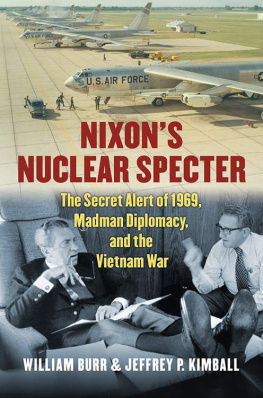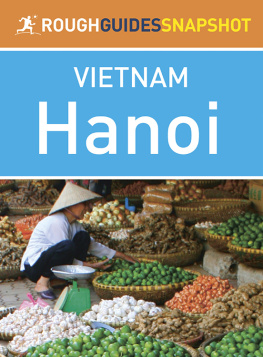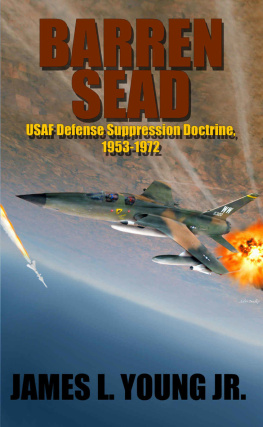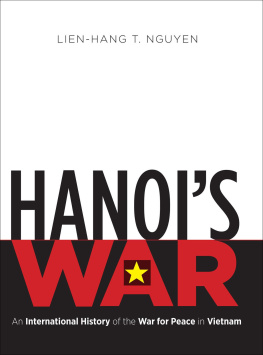COLD WAR
INTERNATIONAL HISTORY PROJECT SERIES
James G. Hershberg
series editor
After Leaning to One Side
China and Its Allies in the Cold War
By Zhihua Shen and Danhui Li
The Cold War in East Asia, 19451991
Edited by Tsuyoshi Hasegawa
Stalin and Togliatti
Italy and the Origins of the Cold War
By Elena Agarossi and Victor Zaslavsky
Radio Free Europe and Radio Liberty
The CIA Years and Beyond
By A. Ross Johnson
After Leaning to One Side
China and Its Allies in the Cold War
By Shen Zhihua and Li Danhui
Rebellious Satellite: Poland 1956
By Pawel Machcewicz
Two Suns in the Heavens
The Sino-Soviet Struggle for Supremacy, 19621967
By Sergey Radchenko
The Soviet Union and the June 1967 Six Day War
Edited by Yaacov Roi and Boris Morozov
Local Consequences of the Global Cold War
Edited by Jeffrey A. Engel
Behind the Bamboo Curtain
China, Vietnam, and the World beyond Asia
Edited by Priscilla Roberts
Failed Illusions
Moscow, Washington, Budapest, and the 1956 Hungarian Revolt
By Charles Gati
Kim Il Sung in the Khrushchev Era
Soviet-DPRK Relations and the Roots of North Korean Despotism, 19531964
By Balzs Szalontai
Confronting Vietnam
Soviet Policy toward the Indochina Conflict, 19541963
By Ilya V. Gaiduk
Economic Cold War
Americas Embargo against China and the Sino-Soviet Alliance, 19491963
By Shu Guang Zhang
Brothers in Arms
The Rise and Fall of the Sino-Soviet Alliance, 19451963
Edited by Odd Arne Westad
Marigold
THE LOST CHANCE FOR PEACE IN VIETNAM
JAMES G. HERSHBERG
Woodrow Wilson Center Press
Washington, D.C.
Stanford University Press
Stanford, California
EDITORIAL OFFICES
Woodrow Wilson Center Press
One Woodrow Wilson Plaza
1300 Pennsylvania Avenue, N.W.
Washington, DC 200043027
Telephone: 202691-4029
www.wilsoncenter.org
ORDER FROM
Stanford University Press
Chicago Distribution Center
11030 South Langley Avenue
Chicago, Il 60628 Telephone: 1-800-621-2736
2012 by James G. Hershberg
All rights reserved
Printed in the United States of America on acid-free paper
2 4 6 8 9 7 5 3 1
Library of Congress Cataloging-in-Publication Data
Hershberg, James G. (James Gordon), 1960
Mairgold : the lost chance for peace in Vietnam / James G. Hershberg.
p. cm. (Cold War International History Project series)
Includes bibliographical references and index.
1. Vietnam War, 19611975Peace. 2. Vietnam War, 19611975Diplomatic history. 3. United StatesForeign relations19631969. I. Title. II. Series: Cold War International History Project series. DS559.7.H48 2011
959.704'31dc23
2011034990
E-book ISBN: 978-0-8047-8388-0

The Woodrow Wilson International Center for Scholars is the national, living U.S. memorial honoring President Woodrow Wilson. In providing an essential link between the worlds of ideas and public policy, the Center addresses current and emerging challenges confronting the United States and the world. The Center promotes policy-relevant research and dialogue to increase understanding and enhance the capabilities and knowledge of leaders, citizens, and institutions worldwide. Created by an act of Congress in 1968, the Center is a nonpartisan institution headquartered in Washington, D.C., and supported by both public and private funds.
Conclusions or opinions expressed in Center publications and programs are those of the authors and speakers and do not necessarily reflect the views of the Center staff, fellows, trustees, advisory groups, or any individuals or organizations that provide financial support to the Center.
The Center is the publisher of The Wilson Quarterly and home of Woodrow Wilson Center Press and dialogue television and radio. For more information about the Centers activities and publications, please visit us on the Web at www.wilsoncenter.org.
Jane Harman, Director, President, and CEO
BOARD OF TRUSTEES
Joseph B. Gildenhorn, Chair
Sander R. Gerber, Vice Chair
Public members: James H. Billington, Librarian of Congress; Hillary R. Clinton, Secretary of State; G. Wayne Clough, Secretary of the Smithsonian Institution; Arne Duncan, Secretary of Education; David Ferriero, Archivist of the United States; James Leach, Chairman of the National Endowment for the Humanities; Kathleen Sebelius, Secretary of Health and Human Services; Melody Barnes, Designated Appointee of the President from within the Federal Government
Private citizen members: Timothy Broas, John T. Casteen III, Charles E. Cobb Jr., Thelma Duggin, Carlos M. Gutierrez, Susan Hutchison, Barry S. Jackson
The Cold War International History Project
The Cold War International History Project was established by the Woodrow Wilson International Center for Scholars in 1991. The project supports the full and prompt release of historical materials by governments on all sides of the Cold War and seeks to disseminate new information and perspectives on Cold War history emerging from previously inaccessible sources on the other sidethe former Communist worldthrough publications, fellowships, and scholarly meetings and conferences. The project publishes the Cold War International History Project Bulletin and a working paper series and maintains a Web site at www.cwihp.org.
At the Woodrow Wilson Center, the project is part of the History and Public Policy Program, directed by Christian F. Ostermann. Previous directors include David Wolff (199798) and James G. Hershberg (199197). The project is overseen by an advisory committee chaired by William Taubman, Amherst College, and includes Michael Beschloss; James H. Billington, Librarian of Congress; Warren I. Cohen, University of Maryland at Baltimore; John Lewis Gaddis, Yale University; James G. Hershberg, George Washington University; Samuel F. Wells Jr., Woodrow Wilson Center; and Sharon Wolchik, George Washington University.
The Cold War International History Project has been supported by the Korea Foundation, Seoul; the Leon Levy Foundation, New York; the Henry Luce Foundation, New York; the John D. and Catherine T. MacArthur Foundation, Chicago; and the Smith Richardson Foundation, Westport, Conn.
For Annie, Gabriel, and Vera Hershberg
and for my parents, Arline and David Hershberg
Maps and Photographs
Maps
Photographs
Introduction
Who Murdered Marigold?
Warsaw, December 6, 1966: a date that should live in diplomatic infamy. Five thousand miles away, the Vietnam War is raging, with the dead piling up and the escalating violence poisoning international affairs and American politics. Early that morning, the Pentagon informs President Lyndon B. Johnson at his Texas ranch that 6,250 U.S. military personnel have been killed in Vietnam (and Laos) since January 1961, when his predecessor, John F. Kennedy, took officebut few imagine that 52,000 more Americans are still to die, along with millions of Vietnamese on both sides of the 17th Parallel. Outwardly, the bloodshed shows no sign of subsiding.
Yet, far from Southeast Asias jungles and rice paddies, in this gray, frigid Central European city, a secret breakthrough for peace seems imminent. The United States and North Vietnam lack diplomatic relations and, relying on combat to resolve their clashing visions, appear stuck in a Catch-22 that precludes direct negotiations: Hanoi insists that it will not talk until Washington stops the bombing it began in early 1965, and Washington maintains just as stubbornly that it will not halt the raids until assured that Hanoi will pay a reasonable price, such as curbing its support for the Communist insurgency fighting to topple the U.S.backed regime in Saigon.
Next page
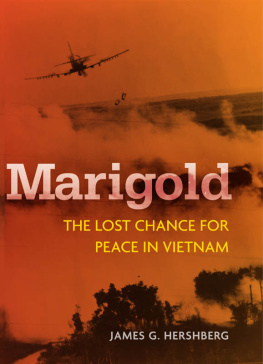

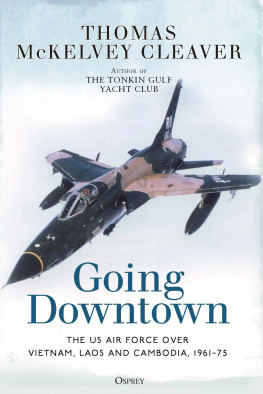
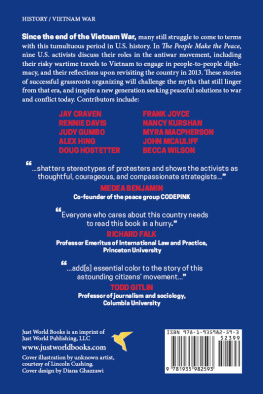
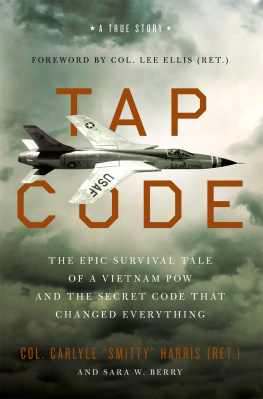
![Thompson Dr Wayne - To Hanoi And Back: The United States Air Force And North Vietnam 1966-1973 [Illustrated Edition]](/uploads/posts/book/150424/thumbs/thompson-dr-wayne-to-hanoi-and-back-the-united.jpg)
